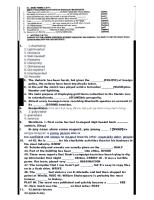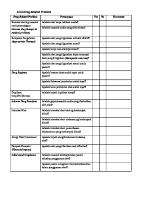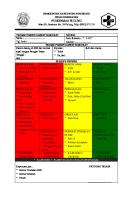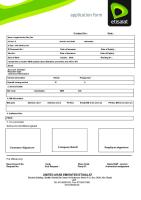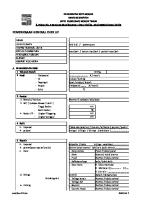Chiropractic Exam Form [PDF]
PROVIDER/CLINIC NAME______________________________________________________________________________ DATE OF VISIT ___/___
25 0 556KB
Papiere empfehlen
![Chiropractic Exam Form [PDF]](https://vdoc.tips/img/200x200/chiropractic-exam-form.jpg)
- Author / Uploaded
- Fernando
Datei wird geladen, bitte warten...
Zitiervorschau
PROVIDER/CLINIC NAME______________________________________________________________________________ DATE OF VISIT ___/___/20___ Check All that Apply:
Patient____________________________________________ DOB________________
_____NEW PATIENT _____ RE-EVALUATION _____ NEW CONDITION _____ ROUTINE VISIT
FOR INITIAL EXAM OR NEW CONDITION, Please give first date you noticed symptoms ____________________________ FOR INITIAL EXAM OR NEW CONDITION, What is your major complaint? _______________________________________
SUBJECTIVE PAIN ASSESSMENT
Right
RATE YOUR PAIN
Left
Place an “X” on the drawings to the left wherever you have pain. Beside the “X” indicate the type of pain you are experiencing: Back
Front
A=Ache B=Burning ST=Stabbing SP=Spasm N=Numbness P=Pins and Needles T=Throbbing (Example: XST between your shoulders mean you have stabbing pain between your shoulders)
PAIN SCALE: Please circle the number that best describes your overall pain: 0 NONE
1
2 LITTLE
3
4
5 MEDIUM
6
7
8 SEVERE
9
10
10+ EXCRUCIATING
PATIENT/LEGAL GUARDIAN SIGNATURE__________________________________________________________ Doctor/Provider Signature _____________________________________________________________________
PROVIDER/CLINIC NAME _____________________________________________________________________ DATE OF VISIT ___/___/20___
Patient____________________________________________ DOB_______
Check ONE: _____INITIAL EXAMINATION _____ RE-EVALUATION
C0 DATE C1
_____ NEW CONDITION
USING ARROWS
ASYMMETRY
TISSUE ABNORMALITIES Mark the Misaligned Vertebrae
C2 C3
T1
C4
T2
C5
T3
A _______ B _______ C _______
T4
C6 C7
T5
D _______
T6
E _______
T7
F _______
T8
G _______
L1 L2 L3
T9
L4
H _______
T10
L5
T11
SAC
T12
I _______
Mark Tissue Abnormalities: TP=Trigger Points, LG=Ligaments (Swollen/Tender), TN=Tendons, SK=Skin, FS=Fascial Restrictions, SP=Spasm, TI=Tightness
L-IL R-IL RANGE OF MOTION ASSESSMENT CERVICAL
NORMAL
Flexion
PAIN
LUMBAR
NORMAL
50
Flexion
60
Extension
60
Extension
25
Left Lat Flex
45
Left Lat Flex
25
Right Lat Flex
45
Right Lat Flex
25
Left Rotation
80
Left Rotation
30
Right Rotation
80
Right Rotation
30
PAIN
Doctor/Provider Signature _____________________________________________________________________
PROVIDER/CLINIC NAME _____________________________________________________________________ DATE OF VISIT ___/___/20___
Patient____________________________________________ DOB_______
Check ONE: _____INITIAL EXAMINATION _____ RE-EVALUATION
_____ NEW CONDITION
EXAMINATION B/P: __________ PULSE: __________ RESP: __________ HT: __________WT: _________ GRIP: (L)______ (R)______
REFLEXES (Wexler Scale)
SENSORY: C5:______ C6:______ C7:______ C8:______ T1:______ L3:______
Biceps _____________
L4:______L5:______ S1:______
D=Deficit N=Normal
(L) or (R)
Triceps _____________
GENERAL ORTHO/NEURO EXAMINATION: (+) or (-), (L) or (R) Brac/rad ____________ Spinous Percus: _________
Babinski __________ Brudzinski __________
Dejerine Triad __________
Rhomberg__________ Valsalva____________
(+)
INDICATION
Patella _____________ Achilles ____________ TEST
(-)
Distraction Jackson Max Cerv Root Compression Cervical Compression Soto Hall Spurling’s Shoulder Depression Libman’s Burn’s Bench Hoover’s Bechterew Beevor’s Minor’s Sign Ely Fajersztajn Nachlas Gluteal Punch Goldthwaite Heel-toe Walk Kemps Lasague Braggards Supported Adam’s
L
R
Nerve Root Compression Nerve Root Compression Nerve Root Compression Nerve Root Compression (cerv) (thor) Vertebral Trauma Nerve Root Irritation Nerve Root Compression (low) (normal) (high) Pain Threshold (hysteria) (Malingering) (hysterical paralysis) (Malingering) Sciatic Disc Compression Abdominal Muscle Weakness Radicular Disc Pain Upper Lumbar Lesion Intervertebral Disc Syndrome Upper Lumbar Lesion Spinal Lesion Lumbar Differentiation 5th Lumbar Motor Deficit Intervetebral Disc Rupture (Muscle) (Disc) (Nerve) Irritation Lumbar Antalgic Spasm Lumbosacral Differentiation
MUSCLE TESTS LEVEL C5 C6 C7
C8
Muscle Deltoids Biceps Wrist Extensors Triceps Wrist Flexors Finger Extensors Finger Flexors
Muscle Grade L: R; L: R: L: R: L: R: L: R: L: R: L: R:
LEVEL T1 L2-L3 L4-L5 L3-L4 L5-S1 L4-L5 S1-S2
Muscle Finger Abductors Hip Flexors Hip Extensors Knee Extensors KneeFlexors Ankle Extensors Ankle Flexors
Muscle Grade L: R: L: R: L: R: L: R: L: R: L: R: L: R:
DIAGNOSIS: _________________________________________________________________________________ ___________________________________________________________________________________________ DOCTOR SIGNATURE ______________________________________________________
DATE ______________________

